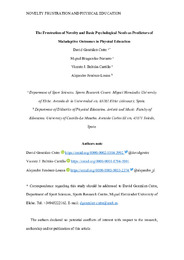Por favor, use este identificador para citar o enlazar este ítem:
https://hdl.handle.net/11000/30419Registro completo de metadatos
| Campo DC | Valor | Lengua/Idioma |
|---|---|---|
| dc.contributor.author | González-Cutre, David | - |
| dc.contributor.author | Brugarolas, Miguel | - |
| dc.contributor.author | Beltrán-Carrillo, Vicente J. | - |
| dc.contributor.author | Jiménez-Loaisa, Alejandro | - |
| dc.contributor.other | Departamentos de la UMH::Ciencias del Deporte | es_ES |
| dc.date.accessioned | 2023-12-19T09:40:21Z | - |
| dc.date.available | 2023-12-19T09:40:21Z | - |
| dc.date.created | 2022-12 | - |
| dc.identifier.citation | Physical Education and Sport Pedagogy | es_ES |
| dc.identifier.issn | 1742-5786 | - |
| dc.identifier.issn | 1740-8989 | - |
| dc.identifier.uri | https://hdl.handle.net/11000/30419 | - |
| dc.description.abstract | Background The need for novelty has been recently proposed as a candidate need within basic psychological needs theory (BPNT). In physical education (PE), research has shown that meeting students’ need for novelty is often positively associated with enhanced (and negatively associated with impaired) pupils’ well-being. Frustrating students’ novelty has also been negatively related to achieving multiple positive outcomes in PE. However, no research has explored whether frustration of novelty is positively associated with maladaptive consequences for pupils in this educational context, which is a necessary criterion to be included within BPNT. Purpose In this correlational study, we aimed to determine whether frustration of novelty was associated with up to 10 maladaptive outcomes in a similar way as the frustration of the three basic psychological needs (autonomy, competence, and relatedness). The maladaptive outcomes analyzed were amotivation, boredom, negative affect, entity beliefs, fear of failure, worry, concentration disruption, somatic and social physique anxiety, and oppositional defiance. Research design Cross-sectional study. Methods A total of 533 students (Mage = 14.47, SD = 1.34; 56.66% female) from eight secondary schools completed online questionnaires assessing their basic psychological needs frustration, novelty frustration and diverse maladaptive outcomes in PE. Pearson's correlations and hierarchical regression analyses controlling by sex, age, and race, were calculated to test the associations among these variables. Findings The correlation coefficients for novelty frustration were like those found for the three basic psychological needs concerning maladaptive outcomes in PE students. Particularly, hierarchical regression analyses showed that frustrating novelty in PE predicted amotivation (β = .11, p = .039), boredom (β = .23, p < .001), entity beliefs (β = .12, p = .039), and concentration disruption (β = .12, p = .049). Conclusions Results showed that novelty frustration was positively related to experiencing some negative consequences in PE, which is an important criterion within BPNT. Future training programs aimed at promoting optimal (and preventing detrimental) motivational styles in PE teachers could use these results to optimize students’ PE experiences. | es_ES |
| dc.format | application/pdf | es_ES |
| dc.format.extent | 31 | es_ES |
| dc.language.iso | eng | es_ES |
| dc.rights | info:eu-repo/semantics/openAccess | es_ES |
| dc.rights.uri | http://creativecommons.org/licenses/by-nc-nd/4.0/ | * |
| dc.subject | adolescents | es_ES |
| dc.subject | self-determination theory | es_ES |
| dc.subject | autonomy | es_ES |
| dc.subject | competence | es_ES |
| dc.subject | relatedness | es_ES |
| dc.subject.other | CDU::7 -Deportes | es_ES |
| dc.title | The Frustration of Novelty and Basic Psychological Needs as Predictors of Maladaptive Outcomes in Physical Education | es_ES |
| dc.type | info:eu-repo/semantics/article | es_ES |
| dc.relation.publisherversion | https://doi.org/10.1080/17408989.2023.2167969 | es_ES |

Ver/Abrir:
González-Cutre et al. (2023).pdf
545,39 kB
Adobe PDF
Compartir:
 La licencia se describe como: Atribución-NonComercial-NoDerivada 4.0 Internacional.
La licencia se describe como: Atribución-NonComercial-NoDerivada 4.0 Internacional.
.png)